
The rufous-tailed scrub robin is a medium-sized member of the family Muscicapidae. Other common names include the rufous scrub robin, rufous bush chat, rufous bush robin and the rufous warbler. It breeds around the Mediterranean and east to Pakistan. It also breeds south of the Sahara from the Sahel region east to Somalia; these African birds are sometimes considered to be a separate species, the African scrub robin. It is partially migratory, wintering in Africa and India. This is a very rare visitor to northern Europe.

The yellow-billed shrike is a large passerine bird in the shrike family. It is sometimes known as the long-tailed shrike, but this is to be discouraged, since it invites confusion with the long-tailed shrike, Lanius schach, of tropical southern Asia. The yellow-billed shrike is a common resident breeding bird in tropical Africa from Senegal eastwards to Uganda and locally in westernmost Kenya. It frequents forest and other habitats with trees.
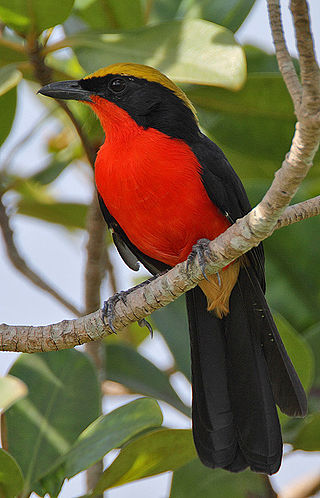
The yellow-crowned gonolek, also known as the common gonolek, is a medium-sized passerine bird in the bushshrike family. It is a common resident breeding bird in equatorial Africa from Senegal and Democratic Republic of Congo east to Ethiopia. It is a skulking bird and frequents dense undergrowth in forests and other wooded habitats. The nest is a cup structure in a bush or tree in which two eggs are laid.
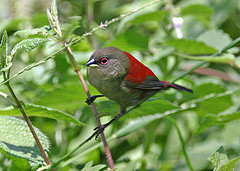
The Abyssinian crimsonwing, also known as the Ethiopian crimsonwing, Salvadori's crimsonwing or crimson-backed forest finch, is a common species of estrildid finch found in eastern Africa. It has an estimated global extent of occurrence of 190,000 km2 (73,000 sq mi).

The bokmakierie is a bushshrike. This family of passerine birds is closely related to the true shrikes in the family Laniidae, and was once included in that group. This species is endemic to southern Africa, mainly in South Africa and Namibia, with an isolated population in the mountains of eastern Zimbabwe and western Mozambique.
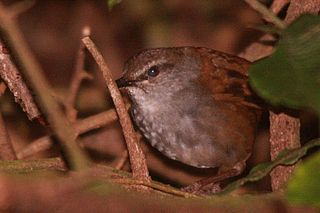
The Sulawesi bush warbler is a species of Old World warbler in the family Locustellidae. It is endemic to the island of Sulawesi in Indonesia where it is found on the forest floor.

The black-headed tailorbird, also known as the white-browed tailorbird, is a species of songbird in the cisticola family, Cisticolidae. First formally described by the Scottish ornithologist Arthur Hay in 1877, it is endemic to the southeastern Philippines, where it is found on the islands of Mindanao, Dinagat, and Siargao. It inhabits dense undergrowth in lowland forests at elevations of up to 1,000 m (3,300 ft).
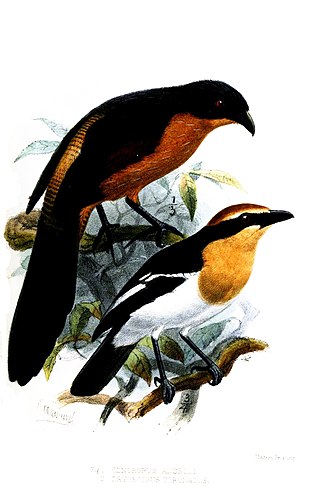
The Gabon coucal is a species of cuckoo in the family Cuculidae. It is mainly found in Gabon but also occurs in neighboring areas of Cameroon, Angola, the Central African Republic, the western Congo Basin and Equatorial Guinea.

The black-throated coucal is a species of cuckoo in the family Cuculidae. It is found in West Africa in dense second growth along forest edge and grassy swamps. The subspecies found in northern and central Zaire is sometimes split as Neumann's coucal.
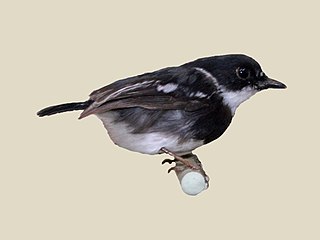
The Rwenzori batis is a bird native to the Albertine Rift montane forests, where it inhabits altitudes of 1,340–3,300 m (4,400–10,830 ft).
The Gabon batis or Verreaux's batis, is a species of small bird in the family Platysteiridae. It occurs in the humid forests of western Central Africa.
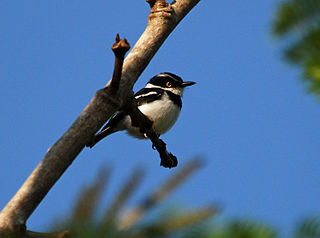
The eastern black-headed batis is a passerine bird in the family Platysteiridae from eastern Africa. It was formerly treated as conspecific with the western black-headed batis.

The forest batis or short-tailed batis is a species of bird in the wattle-eye family, Platysteiridae occurring in eastern Africa.
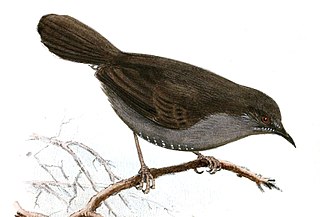
The grey wren-warbler is a species of bird in the family Cisticolidae. It is found in Angola, Burundi, Democratic Republic of the Congo, Ethiopia, Kenya, Malawi, Rwanda, Somalia, South Sudan, Tanzania, Uganda, and Zambia. Its natural habitat is dry savanna.
Fülleborn's boubou is a species of bird in the family Malaconotidae. It is found in Malawi, Tanzania, and Zambia, where its typical habitat is humid montane forest, dense undergrowth, secondary growth, forest edges and bamboo groves. The name of this bird commemorates the German physician Friedrich Fülleborn.
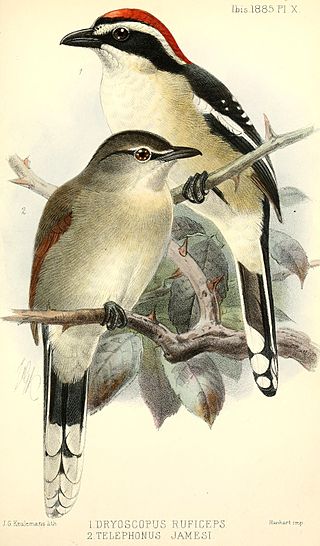
The red-naped bushshrike or red-naped boubou is a species of bird in the family Malaconotidae, which is native to the dry lowlands of the eastern Afrotropics.

Mackinnon's shrike, also called Mackinnon's fiscal, is a songbird species of the family Laniidae. Its natural habitats are subtropical or tropical moist montane forests and moist savanna. It is not considered a threatened species by the IUCN.The population of this species is increasing, which is thought to be due to the degradation of nearby habitat. Its common name and Latin binomial commemorate Archibald Donald MacKinnon.

Lagden's bushshrike is a bird species in the bushshrike family (Malaconotidae) native to Africa. It is a stocky bird with yellow or orange-yellow underparts, olive green upperparts, a grey head and heavy bill. Two subspecies are recognised, one found in west Africa and one in central Africa.

The gorgeous bushshrike is a species of bird in the family Malaconotidae. It is also known as the four-coloured bushshrike. Some use the name gorgeous bushshrike for the subspecies Telophorus viridis viridis only.

The black-fronted bushshrike is a passerine bird of the bushshrike family, Malaconotidae. It inhabits forests mainly in East Africa. It forms a superspecies with the many-colored bushshrike and the two are sometimes considered to be a single species.




















